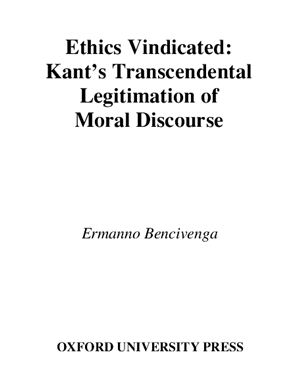Oxford University Press, USA, 2008. 208 pages.
Can we regard ourselves as having free will? What is the place of values in a world of facts? What grounds the authority of moral injunctions, and why should we care about them? Unless we provide satisfactory answers to these questions, ethics has no credible status and is likely to be subsumed by psychology, history, or rational decision theory. According to Ermanno Bencivenga, this outcome is both common and regrettable.
Bencivenga points to Immanuel Kant for the solution. Kant's philosophy is a sustained, bold, and successful effort aiming at offering us the answers we need. Ethics Vindicated is a clear and thorough account of this effort that builds on Bencivenga's previous interpretation of transcendental philosophy (as articulated in his Kant's Copeican Revolution) and draws on the entire Kantian corpus.
Can we regard ourselves as having free will? What is the place of values in a world of facts? What grounds the authority of moral injunctions, and why should we care about them? Unless we provide satisfactory answers to these questions, ethics has no credible status and is likely to be subsumed by psychology, history, or rational decision theory. According to Ermanno Bencivenga, this outcome is both common and regrettable.
Bencivenga points to Immanuel Kant for the solution. Kant's philosophy is a sustained, bold, and successful effort aiming at offering us the answers we need. Ethics Vindicated is a clear and thorough account of this effort that builds on Bencivenga's previous interpretation of transcendental philosophy (as articulated in his Kant's Copeican Revolution) and draws on the entire Kantian corpus.

